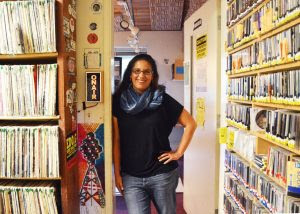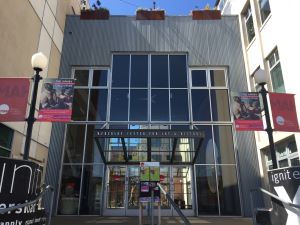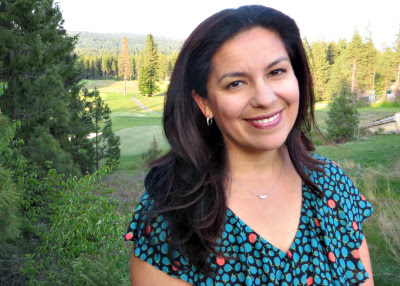By: Aleisha LaCruise
Tell us a bit about yourself, your background, and how your path led to where you are today.
I am an associate professor of Latin American and Latino Studies and the director of the Research Center for the Americas. I have been at UC Santa Cruz since 2010 and arrived here from UC Riverside, where I was a UC President’s Postdoctoral Fellow for two years. I am a product of a UC education as I earned my Ph.D. in Sociology and Feminist Studies at UC Santa Barbara.
What is the Research Center for the Americas?
Founded in 1992, the Research Center for the Americas (RCA) at the University of California, Santa Cruz advances a broad program of collaborative and interdisciplinary research on Latin America and Chicanx/Latinx Studies, including in the areas of migration, the arts, indigeneity, and California’s Latino and immigrant communities. We host world-class scholars, sponsor initiatives between the campus and the community, and mentor undergraduate students interested in research. In 2019, the RCA established the Human Rights Investigations Lab for the Americas, which trains students to use the internet as a critical tool for fact-finding and evidence gathering for human rights violations and to promote social justice.

What type of work do you do in your role as Director for the RCA?
I’ve advanced several initiatives as director, including an Activist-in-Residence, a community-based journalism project in partnership with Digital NEST in Watsonville, and the Human Rights Investigations Lab, which has an explicit focus on the Americas region. I also organize workshops, symposiums, scholarly talks, and administer several research grants.
How have you been able to incorporate Sustainability into your position?
When we had events in person at the RCA, we always prioritized ways to reduce our footprint, so we started to provide campus visitors with water bottles purchased from the Baytree bookstore instead of giving them a water bottle for single use. We always made sure composting and recycling options would be available at our events that had food and stayed away from using plastic bags. We added recycling bins in the office to make sure we could recycle all items easily, and we relied on the Surplus Store for our office furniture rather than buying new items. We make our decisions thinking about what’s best for the planet and tried to remember to put that into practice.
What is the Human Rights Investigations Lab for the Americas? How did you and your team come up with the idea?
The Human Rights Investigations Lab for the Americas is dedicated to offering digital verification support to non-governmental organizations, news outlets, and other advocacy partners that are conducting open-source investigations. The Lab’s social justice mission is to track and monitor ongoing humanitarian, environmental and socio-political crises throughout the Americas by using open-source investigative methods to promote justice and achieve accountability for communities adversely affected by human rights violations. You can learn more about our open-source research on the uprisings in Chile here.
We understand the RCA has held events at the local MAH, Santa Cruz Museum of Art & History. What collaborations have you done with the MAH, and what is the significance of this relationship?
Having community partners is important. We like to host events there so that members of our community can join. For the past couple of years, we’ve partnered with the MAH on a student photo scholarship contest, which you can read about here.
You won the National Women’s Studies Association book award in 2016. Could you talk about the book that was chosen for this award?

The Museum of Art and History (MAH)
In Power Interrupted: Antiracist and Feminist Activism inside the United Nations (2016, University of Washington Press), I examine UN-based feminist activism within UN forums on racism. My analysis of UN antiracism spaces, particularly the 2001 World Conference against Racism, Racial Discrimination, Xenophobia, and Related Intolerance in Durban, South Africa, considers how a race and gender intersectionality approach broadened opportunities for feminist organizing at the global level. My research included a combination of interviews, participant observation, and extensive archival data to talk about compelling forms of antiracist feminist organizing from the Americas-specifically the activism of feminists of color from the United States and Canada, and feminists from Mexico and Perú-alongside the UN’s agenda against racism.
What is it like being the producer and host of the weekly public affairs radio program Voces Críticas/Critical Voices, and how did Voces Críticas begin?
Currently, the show is on hiatus due to COVID-19 and the increasing demands of my job, but I’d invite you to read this story about why I started the show as I plan to return to it in the near future. You can find all of my previous shows on Soundcloud and iTunes as I had some great interviews. I really was eager to have smart conversations over the air and plan to do so again.
Sustainability means that as people, we are stewards of the earth, and so we have a responsibility to care for her well-being for future generations.

